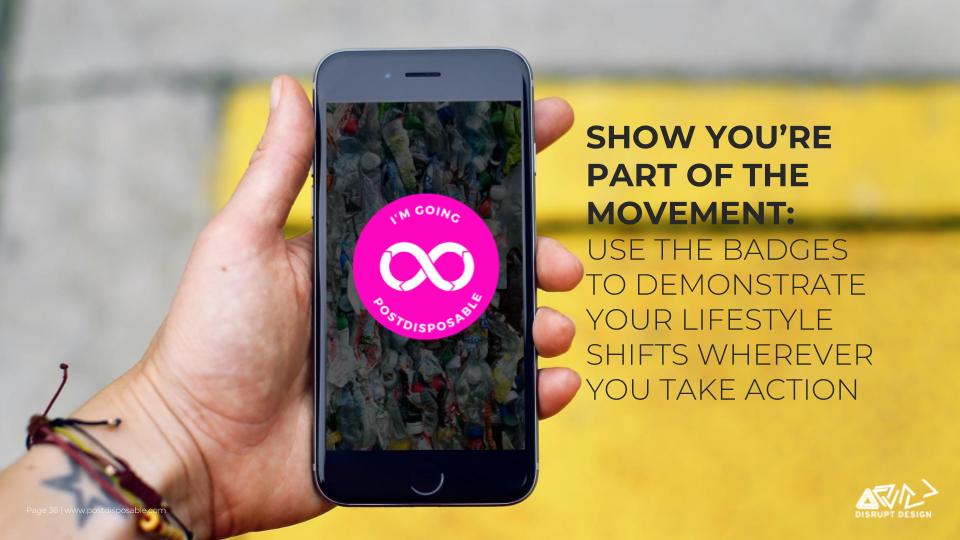MEET THE GLOBAL MOVEMENT TO REDESIGN THE WORLD’S SYSTEMS TO BE #POSTDISPOSABLE
THIS IS A GLOBAL REDESIGN CHALLENGE TO MOVE BEYOND DISPOSABILITY
This movement activates individuals, governments, and industry to rapidly redesign our polluting systems of production and consumption to turn the tides on the massive environmental and social burdens that disposability has led us to. We are activating a global movement to design a positive future for the planet.
DO YOU BELIEVE THE WORLD IS READY TO GO POST DISPOSABLE?
we BELIEVE we can design a FUTURE that is POST DISPOSABLE, where we make waste obsolete.
#PostDisposable is a global movement to rapidly redesign the systems that sustain wastefulness and contribute to pollution by reframing the negative narrative into positive actions.
Rather than continuing to have linear, single-use products polluting the planet, #PostDisposable challenges people, industries, and governments to rapidly integrate closed-loop systems that maintain value, advancing the circular economy and amplifying positive change in the world.
the question is: HOW QUICKLY CAN WE redesign our products and SERVICES to GET us all THERE?
the challenge
How quickly can all 7.4 billion people on the planet move to a post-disposable future?
LET'S WORK ON A FUTURE THAT'S POSITIVE FOR ALL OF US.
Everything from the chair you are sitting in, to the device you are reading this on, absolutely everything is designed - and therefore, can be redesigned to be move beyond disposability.
Hyper-disposable culture has resulted in excessive material extraction, resource depletion, and extreme waste. This linear disposable system hurts everyone and is unsustainable.
If we work together, with the right tools, we can redesign products, services, and systems for a circular and sustainable future.
WE NEED PEOPLE LIKE YOU TO JOIN THis GLOBAL MOVEMENT TO DISRUPT DISPOSABILITY
WHY DO WE NEED TO GO #POSTDISPOSABLE?
WE HAVE BECOME A HYPER- DISPOSABLE PLANET
And recycling validates the production of waste, which means we need a variety of alternative solutions to move beyond disposability.
THE UNITED NATIONS PREDICTS THAT BY 2050, THERE WILL BE MORE PLASTIC IN THE OCEAN THAN FISH
The human health impacts and ecosystem damages from our hyper-disposable society are more than evident.
Recycling is not the only solution. It perpetuates the issues by validating the production of disposable products. We can't expect that recycling alone will curb the out-of-control global disposability issue.
We need to redesign the systems of production and consumption to embrace a circular, post- disposable world. This fits in with the United Nations Sustainable Development Goal 12, to produce goods and services in sustainable ways.
The world needs tangible solutions from government commitments through to individual lifestyle choices, if we are to move to a sustainable, circular, and regenerative planet. We are jumpstarting the transition - are you ready to be part of the post-disposable future?
Products are currently designed to be thrown away
Everywhere you look, you will see single-use products intentionally created to be wasted
we have designed ourselves into a linear (wasteful) economy
as a result, WASTE HAS BECOME SOCIALLY NORMALIzED
HOW DO YOU FEEL AFTER hearing these OVERWHELMING PROBLEMS?
do you feel bad? many people do
we are changing the narrative to one of positive action
Negativity is a disabler to action. Humans have a predisposition to experience negativity bias. When we see negative concepts, we are often disabled from action through the generation of fear.
This common approach focuses on taking things away from people (i.e., ‘zero-waste’). It creates a reductionist and negative mindset, making people feel overwhelmed, deprived, and as though there is nothing they can do that will make a difference.
#PostDisposable is a positively-framed campaign with actions and excitement as the core motivator.
This speaks to more people to advance the movement toward a positive post-disposable future.
THE SCIENCE OF FEAR
Negativity Bias is our predisposition to focus on the negative aspects of a situation.
All humans have it, and it hijacks our brains: we feel losses more than gains.
Fear is generally an ineffective tool for motivating genuine personal engagement.
– O'Neill, Nicholson-Cole (2009)
RECYCLING MOVEMENTS HAVE HELPED PERPETUATE THE “PROBLEM NARRATIVE”
WE BELIEVE THE FUTURE IS POST DISPOSABLE
HERE’S WHY:
WE CAN DESIGN OUR WAY OUT OF LINEAR SYSTEMS AND INTO CIRCULAR SYSTEMS
Only 14% of the hundreds of millions of tons of electronic waste generated each year is recycled. Industry has become accustomed to designing things to break through planned obsolescence, which normalizes wastefulness.
We lose valuable materials from the system, hurt already impoverished people who have to process the waste, and create a global system of de-valuing consumer goods. The circular economy addresses this problem.
The #PostDisposable campaign elevates everyday conversations into actions, activates excitement about the possibilities, and helps to normalize post- disposable lifestyles.
IT’S ALREADY HAPPENING!
The global movement for a post-disposable planet is already growing strong with entire countries pledging to replace highly disposable items. Companies are investing in R&D, and individuals are taking personal actions to reduce their disposable additions. This is the Circular Economy Movement.
The #PostDisposable campaign catalyzes that existing energy for change and levels up the movement by promoting new ways to motivate action, providing inspiration for easy transitions, and creating a centralized positively-framed narrative for change.
FRANCE, INDIA & KENYA ARE ALL BANNING DISPOSABLES
Vessel Works: a library system for coffee cups
Grab a stainless steel mug, enjoy your drink anywhere, and drop it off at participating cafes and drop points around the city.
The circular economy is helping make the transition happen, influencing shifts in the financial sector and the design of products and services we all rely on.
Big players in industry and government are pioneering products, systems, and services that will help to move us away from single-use products and systems, to closed loop ones.
ALTERNATIVES ARE BEING DESIGNED all over the world
Ooho! the edible water bottle
The goal of Ooho is to create a waste-free alternative to plastic bottles and cups.
Don't recycle water bottles, eat them instead. This spherical packaging is made of seaweed: entirely natural, biodegradable and edible.
ReGrained harvests used grain from craft beer makers.
They create delicious recipes with this flavorful, nutritious ingredient that would otherwise have gone to waste.
Evoware: EAT THE plastic wrapper
This new food packaging is made from seaweed instead of plastic. The wrapper is nutritious if it’s eaten, and if it ends up as litter, it naturally biodegrades.
ALL MOVEMENTS NEED VISIONARIES AND PIONEERS
ARE YOU A PIONEER, READY TO JOIN THE #POSTDISPOSABLE REVOLUTION?
WE NEED YOUR HELP TO REDESIGN THE PROBLEM NARRATIVE TO ONE OF POSITIVE SOLUTIONS, OPPORTUNITIES, AND POSSIBILITIES
BE A PART OF DESIGNING
THE #POSTDISPOSABLE MOVEMENT WITH US
YOUR DESIGN CHALLENGE
REDESIGN YOUR LIFE, design an iniTIative, product, system, service, OR campaigN that makes disposability obsolete
pitch it to us and we WILL HELP SPREAD YOUR ideas with the world
JOIN US IN CATALYZING A GLOBAL MOVEMENT THAT EMPOWERS AND MOTIVATES ACTION
“THE BEST WAY TO PREDICT THE FUTURE IS TO DESIGN IT.”
WHO IS BEHIND THIS MOVEMENT?
UNEP CHAMPION OF THE EARTH
DISRUPT DESIGN IS FOUNDED BY AWARD-WINNING DESIGNER, SUSTAINABILITY PROVOCATEUR, AND UNEP 2016 CHAMPION OF THE EARTH, DR. LEYLA ACAROGLU.
Leyla has spent over 15 years building and driving change across education, industry, and governments globally. She is a world-leading provocateur on the transition to the circular economy and the normalization of sustainability through design and creative initiatives.
Leyla has a PhD in creative change. She developed the Disruptive Design Method and is a powerhouse in leading the movement towards a regenerative future. Her expertise is sought after by governments, CEOs, and universities around the world.
NARRATIVE FLIP TO A POSITIVE FUTURE
To make change, we don’t need to change individual behaviors. We need to change the conditions that people exist within, giving alternative narratives and ways of being that are positive and regenerative for the planet.
We can rapidly move to sustainable lifestyles by designing new systems that make the old obsolete.
This is what Disruptive Design is all about: design that changes systems at the root level so they grow into transformative change.
























